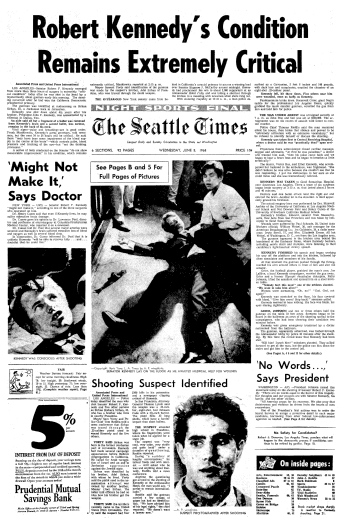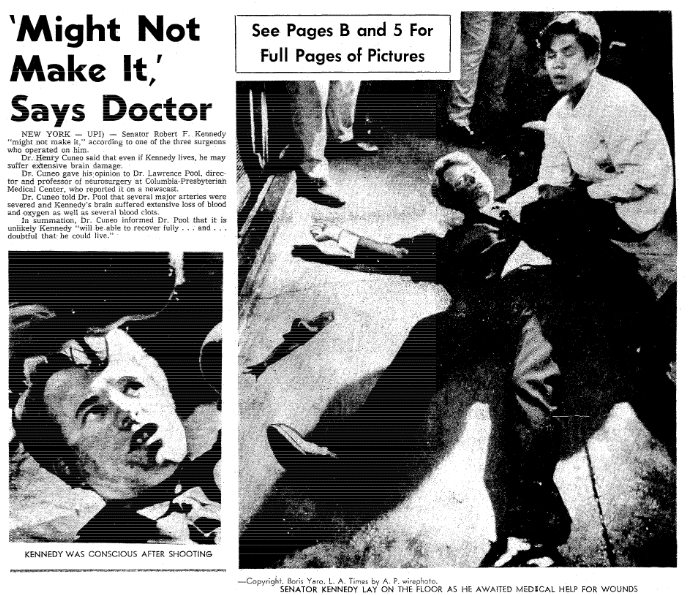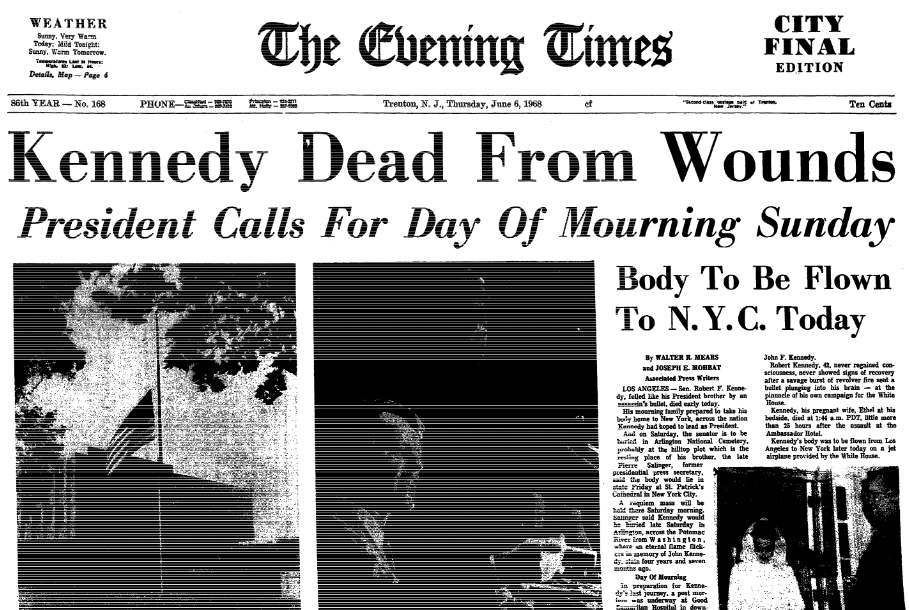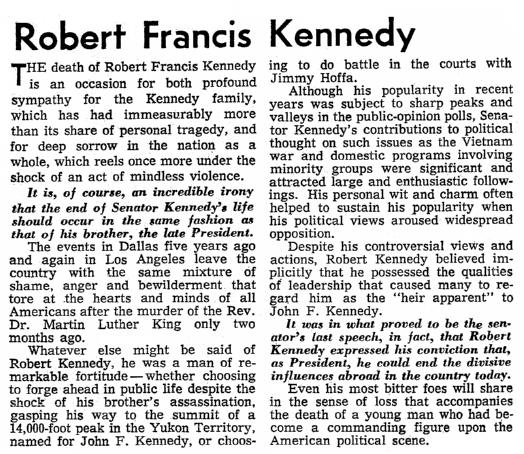Only 4½ years after his brother, President John F. Kennedy, was assassinated – and just two months after civil rights leader Dr. Martin Luther King, Jr., had been gunned down – America awoke on 5 June 1968 to read the horrifying news that another of the nation’s young leaders had been attacked: Senator Robert F. Kennedy. He was shot three times by a Jordanian, Sirhan Sirhan, in the Ambassador Hotel in Los Angeles right after giving a victory speech in the California Democratic presidential primary. Five others were wounded as well.

Kennedy had only entered the presidential primary in March, but was rapidly gaining momentum. Winning the California Democratic primary over his rival Senator Eugene J. McCarthy on June 4, Kennedy gave his victory speech to a gathering of about 2,000 buoyant supporters in the hotel’s ballroom. He ended his speech shortly after midnight and headed for the hotel’s kitchen, a shortcut to get to a press conference. At 12:15 a.m. on June 5 Sirhan struck and Kennedy fell to the floor, shot three times, bleeding and mortally wounded.
He clung to life for 26 difficult hours, but died early in the morning of June 6. He was 42 years old. America had lost another leader, felled by an assassin. Sirhan later said he was angry over Kennedy’s support for Israel.
Americans opened their daily newspapers on 5 June 1968 and saw the shocking news. This Seattle newspaper dedicated its entire front page to Kennedy’s shooting.

That front page included these chilling photos.

Here is a transcription of the four articles that appeared on that front page.
Robert Kennedy’s Condition Remains Extremely Critical
Associated Press and United Press International
Los Angeles – Senator Robert F. Kennedy emerged from more than three hours of surgery in extremely “critical condition” today after he was shot in the head by a mysteriously silent gunman early this morning. The shooting occurred after he had won the California Democratic presidential primary.
The gunman was identified at midmorning as Sirhan Sirhan, 23, a Jordanian born in Jerusalem.
Kennedy was shot down about 4½ years after his brother, President John F. Kennedy, was assassinated by a rifleman in Dallas, Tex.
An aide said all but a fragment of a bullet was removed from Kennedy’s brain and a second bullet, less serious, remains in the back of his neck.
Vital signs – pulse and breathing – are in good order, Frank Mankiewicz, Kennedy’s press secretary, told newsmen, but the next 24 to 36 hours will be critical. He said there “may have been some impairment of the blood supply to the center of the brain” – which controls pulse, blood pressure and tracking of the eye – but “not the thinking processes.”
A series of tests conducted on the senator “do not show measurable improvement” in his condition, which remains extremely critical, Mankiewicz reported at 2:15 p.m.
Mayor Samuel Yorty said identification of the gunman was made by the suspect’s brother, Adel Sirhan of Pasadena, who was traced through the death weapon.
The 42-year-old New York senator came from behind in California’s crucial primary to accrue a winning lead over Senator Eugene J. McCarthy around midnight. Kennedy had proclaimed his win to about 2,000 supporters at an Ambassador Hotel rally and was taking a shortcut through the kitchen to a meeting with newsmen when shots rang out.
With stunning rapidity at 12:15 a.m., a man police described as a Caucasian, 5 feet 6 inches and 140 pounds, with dark hair and complexion, emptied the chamber of an eight-shot .22-caliber pistol.
Kennedy fell, hit three times. Five others near him were wounded, none as badly as Kennedy.
Pandemonium broke loose. Roosevelt Grier, giant Negro tackle for the professional Los Angeles Rams, quickly grabbed the much smaller gunman, wrestled the gun from him and held him for police.
The man under arrest was arraigned secretly at 7 a.m. as John Doe and bail was set at $250,000. The arraignment was on six accounts of assault with intent to commit murder.
Police Chief Thomas Reddin said the man remained silent for hours, then broke that silence and proved to be “extremely articulate with an extensive vocabulary,” but he refused to identify himself or discuss the shooting.
Kennedy was taken first to Central Receiving Hospital, where a doctor said he was “practically dead” upon arrival.
Physicians there administered closed cardiac massage, oxygen and adrenalin. “At first he was pulseless,” a doctor who treated him said, “then his pulse came back and we began to hear a heartbeat and he began to breathe – a little erratically.”
The doctor, Victor Baz, said Ethel Kennedy, who accompanied her husband in the ambulance, was frightened. “She didn’t believe he was alive because she couldn’t see that he was responding. I put the stethoscope to her ears so she could listen and she was tremendously relieved.”
Kennedy was taken to Good Samaritan Hospital near downtown Los Angeles. There a team of six surgeons began brain surgery at 3:12 a.m. that lasted about 3 hours and 40 minutes.
Doctors said one bullet struck near the right ear and entered the brain. Another hit in the shoulder. A third apparently grazed his forehead.
The actual surgery here was performed by Drs. Maxwell Ambler of the University of California at Los Angeles Medical School and Nat Downes Reid and Henry Cuneo of the University of Southern California Medical School.
Kennedy’s brother, Edward, senator from Massachusetts, flew here from San Francisco and was taken by helicopter to Good Samaritan.
Wounds were suffered by Paul Schrade, 30, United Auto Workers official; William Weisel, 30, unit manager for the American Broadcasting Co.; Ira Goldstein, 19, a radio newsman; Irwin Stroll, 17; and Mrs. Elizabeth Evans. All but Weisel, of Washington, D.C., are from the Los Angeles area.
The gunman appeared in the kitchen area behind the bandstand of the Embassy Room, where Kennedy backers, including movie stars and students, were listening to their candidate’s light-hearted victory speech.
Kennedy finished his speech and began working his way off the platform and into the kitchen, followed by close associates and members of his family.
At that moment the gunman pushed through the throng, reached his arm around others in front of him and shot the senator.
Grier, the football player, grabbed the man’s arm. Joe LaHive, a local Kennedy campaigner, wrested the gun away. Grier and a former Olympic decathlon champion, Rafer Johnson, lifted the assailant and spread him on a steel kitchen table.
“Nobody hurt this man!” one of the athletes shouted. “We want to take him alive!”
Women were screaming, “Oh no!” “God, God, not again!”
Kennedy was stretched on the floor, his face covered with blood. “Give him room! Step back!” someone yelled.
Kennedy seemed to hear nothing. His face was blank, his eyes staring sightlessly.
Grier, Johnson and two or three others held the gunman on the table 10 feet away. Screams began to be heard in the ballroom as news of the shooting spread to the campaigners, who had been cheering their candidate two minutes before.
Kennedy was given emergency treatment by a doctor summoned from the ballroom.
The gunman, apparently unharmed, was rushed through the Ambassador lobby by police 10 minutes after the shooting. By this time the crowd knew that Kennedy had been shot.
“Kill him! Lynch him!” onlookers shouted. They milled forward to get at the man, but the police ran him down the stairs and got him to the central jail.
‘Might Not Make It,’ Says Doctor
New York (UPI) – Senator Robert F. Kennedy “might not make it,” according to one of the three surgeons who operated on him.
Dr. Henry Cuneo said that even if Kennedy lives, he may suffer extensive brain damage.
Dr. Cuneo gave his opinion to Dr. Lawrence Pool, director and professor of neurosurgery at Columbia-Presbyterian Medical Center, who reported it on a newscast.
Dr. Cuneo told Dr. Pool that several major arteries were severed and Kennedy’s brain suffered extensive loss of blood and oxygen as well as several blood clots.
In summation, Dr. Cuneo informed Dr. Pool that it is unlikely Kennedy “will be able to recover fully…and…doubtful that he could live.”
‘No Words…’ Says President
Washington (AP) – President Johnson issued this statement today on the shooting of Senator Robert F. Kennedy: “There are no words equal to the horror of this tragedy. Our thoughts and our prayers are with Senator Kennedy, his family, and the other victims.
“All America prays for his recovery. We also pray that divisiveness and violence be driven from the hearts of men everywhere.”
One of the President’s first actions was to order the Secret Service to assign a protective detail to each major candidate, borrowing from other federal law enforcement agencies as needed.
Shooting Suspect Identified
Associated Press and United Press International
Los Angeles – Police today identified the man who shot Senator Robert F. Kennedy and five other persons as Sirhan Bishara Sirhan, 23, who has a brother who lives in nearby Pasadena.
Mayor Sam Yorty and Police Chief Tom Reddin told a news conference that Sirhan was traced through the .22-caliber pistol used to wound Kennedy and the five others.
Yorty said Sirhan was born in the former Jordanian part of Jerusalem. Kennedy had made several campaign appearances before Hebrew congregations in California. He called for Arab recognition of Israel and an end to Jordanian aggression against the Jewish state.
Sirhan was identified by his brother, Adel Sirhan, with whom he lived. Yorty said the pistol used in the assassination attempt was owned by another brother, Munier (Joe) Sirhan. The latter told officers he had no idea how his brother got the weapon.
Yorty said the brothers recently came to the United States from Jerusalem. Yorty said the suspect had four $100 bills in his possession and a newspaper clipping critical of Kennedy.
In San Francisco, Attorney General Thomas Lynch said the weapon was a .22-caliber, eight shot, Iver Johnson Cade with a 2½-inch barrel. The pistol fires .22 long shells, which have a harder impact than short bullets.
The suspect attended high school in Pasadena, where his fingerprints were taken when he applied for a state job.
The suspect was “very cool, very calm, very stable and quite lucid” under a drumfire of questioning, Reddin reported.
During “a number of lengthy conversations,” he talked freely and with interest – until asked who he was and anything about Kennedy, Reddin told a news conference.
Anytime the questioning got around to the shooting of Kennedy at the Ambassador Hotel, the man would say, “I prefer to remain incommunicado.”
Reddin said the gunman carried a few scraps of paper but had no identification. “We have advised him of his legal rights,” the chief reported. “He doesn’t want a lawyer now.”

Here is a transcription of this front-page article reporting Kennedy’s death.
Kennedy Dead from Wounds
President Calls for Day of Mourning Sunday
Body to Be Flown to N.Y.C. Today
By Walter R. Mears and Joseph E. Mohbat, Associated Press Writers
Los Angeles – Sen. Robert F. Kennedy, felled like his President brother by an assassin’s bullet, died early today.
His mourning family prepared to take his body home to New York, across the nation Kennedy had hoped to lead as President.
And on Saturday, the senator is to be buried in Arlington National Cemetery, probably at the hilltop plot which is the resting place of his brother, the late John F. Kennedy.
Robert Kennedy, 42, never regained consciousness, never showed signs of recovery after a savage burst of revolver fire sent a bullet plunging into his brain – at the pinnacle of his own campaign for the White House.
Kennedy, his pregnant wife Ethel at his bedside, died at 1:44 PDT, little more than 25 hours after the assault at the Ambassador Hotel.
Kennedy’s body was to be flown from Los Angeles to New York later today on a jet airplane provided by the White House.
Pierre Salinger, former presidential press secretary, said the body would lie in state Friday at St. Patrick’s Cathedral in New York City.
A requiem mass will be held there Saturday morning. Salinger said Kennedy would be buried late Saturday in Arlington, across the Potomac River from Washington, where an eternal flame flickers in memory of John Kennedy, slain four years and seven months ago.
Day of Mourning
In preparation for Kennedy’s last journey, a post mortem was underway at Good Samaritan Hospital in downtown Los Angeles.
President Johnson, the man who succeeded President Kennedy, issued a proclamation calling for a national day of mourning for the senator next Sunday.
Gov. Ronald Reagan declared a state of mourning in California, for the period through the senator’s funeral.
As Kennedy died, the man accused of shooting him was under heavy guard at a downtown prison hospital, held in $250,000 bail for a court appearance which had been scheduled Monday.
Sirhan Bishara Sirhan was accused of wielding the .22-caliber revolver which cut down Kennedy and wounded five other people early Wednesday as the senator and his supporters celebrated victory in the California presidential primary.
Asst. Dist. Atty. William L. Ritzi said his office would ask the Los Angeles County Grand Jury to indict Sirhan on a charge of murder.
The Los Angeles sheriff’s office refused to say whether Sirhan had been advised that Kennedy was dead.
Sirhan, a Jordanian who had been living in Pasadena, was described by those who knew him as a man inflamed over the hostilities between his native state and Israel. A former employer said he might have been enraged by Kennedy’s past words of support for Israel.
Kennedy’s mother, Mrs. Rose Kennedy, was told of the death of her son by a niece, Ann Gargan. She was at Hyannis Port, Mass. Mrs. Kennedy – who had campaigned for Robert in the presidential primaries – went to mass at St. Francis Xavier Church.
The senator’s father, Ambassador Joseph P. Kennedy, was not awakened immediately to be told of the death.
Mrs. Kennedy had talked by telephone with Sen. Edward M. Kennedy, D-Mass., the family’s lone surviving son, who was at Robert’s bedside at the end.
Kennedy was surrounded by members of his family when he died.
Salinger said Ethel, the widow, “is bearing up very well.”
Mrs. John F. Kennedy, widow of the assassinated President, was in her brother-in-law’s room when he died.
Children Nearby
Two of Kennedy’s sisters, Mrs. Stephen Smith and Mrs. Patricia Lawford, were there, too.
Salinger said three of Kennedy’s 10 children were in an adjacent room and saw their father before he died.
Pale and haggard, Frank Mankiewicz, Kennedy’s press secretary, announced the death to newsmen.
“Sen. Robert Francis Kennedy died at 1:44 a.m. today,” he began.
Then he answered questions. What was the specific cause of death?
Mankiewicz looked up numbly.
“The gunfire attack,” he said.
He said “the bullet that went into the head near the right ear” was the fatal shot. It entered Kennedy’s brain. Surgeons operated for three hours and 40 minutes to remove all but a fragment in a vain attempt to save the senator’s life.
But Kennedy never rallied.
“It was not a question of his sinking,” Mankiewicz said, “but of not rising. He needed a rally and steady improvement in his condition, and that did not develop.”
Salinger announced the body was to be taken from Los Angeles between 10 and 11 a.m. PDT. He said the family, friends and some staff members were to be aboard.
Among them, he said, would be Mrs. Martin Luther King Jr., whose husband fell prey to an assassin on April 4.

Here is a transcription of this editorial.
Robert Francis Kennedy
The death of Robert Francis Kennedy is an occasion for both profound sympathy for the Kennedy family, which has had immeasurably more than its share of personal tragedy, and for deep sorrow in the nation as a whole, which reels once more under the shock of an act of mindless violence.
It is, of course, an incredible irony that the end of Senator Kennedy’s life should occur in the same fashion as that of his brother, the late President.
The events in Dallas five years ago and again in Los Angeles leave the country with the same mixture of shame, anger and bewilderment that tore at the hearts and minds of all Americans after the murder of the Rev. Dr. Martin Luther King only two months ago.
Whatever else might be said of Robert Kennedy, he was a man of remarkable fortitude – whether choosing to forge ahead in public life despite the shock of his brother’s assassination, gasping his way to the summit of a 14,000-foot peak in the Yukon Territory, named for John F. Kennedy, or choosing to do battle in the courts with Jimmy Hoffa.
Although his popularity in recent years was subject to sharp peaks and valleys in the public-opinion polls, Senator Kennedy’s contributions to political thought on such subjects as the Vietnam war and domestic programs involving minority groups were significant and attracted large and enthusiastic followings. His personal wit and charm often helped to sustain his popularity when his political views aroused widespread opposition.
Despite his controversial views and actions, Robert Kennedy believed implicitly that he possessed the qualities of leadership that caused many to regard him as the “heir apparent” to John F. Kennedy.
It was in what proved to be the senator’s last speech, in fact, that Robert Kennedy expressed his conviction that, as President, he could end the divisive influences abroad in the country today.
Even his most bitter foes will share in the sense of loss that accompanies the death of a young man who had become a commanding figure upon the American political scene.
Learn more about Robert F. Kennedy’s life, political career and assassination in GenealogyBank’s newspaper archives: http://www.genealogybank.com/gbnk/?fname=robert+f.&lname=kennedy
Note: An online collection of newspapers, such as GenealogyBank’s Historical Newspaper Archives, is not only a great way to learn about the lives of your ancestors – the old newspaper articles also help you understand American history and the times your ancestors lived in, and the news they talked about and read in their local papers. Do you have memories of the assassination of Robert Kennedy? Please share your stories with us in the comments.
Explore over 330 years of newspapers and historical records in GenealogyBank. Discover your family story! Start a 7-Day Free Trial

No idea why they say he never regained consciousness… he was awake on the floor of the hotel and talked to the bus boy, his wife and the paramedics that attended him… his last words were “no, don’t lift me.”